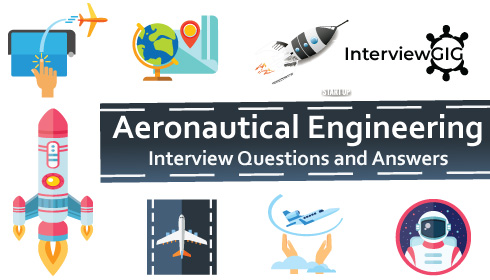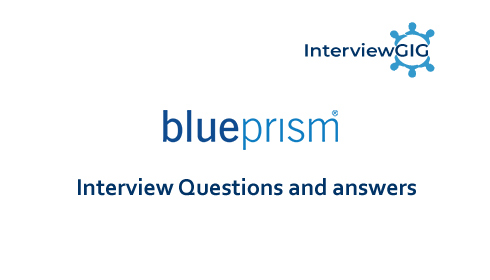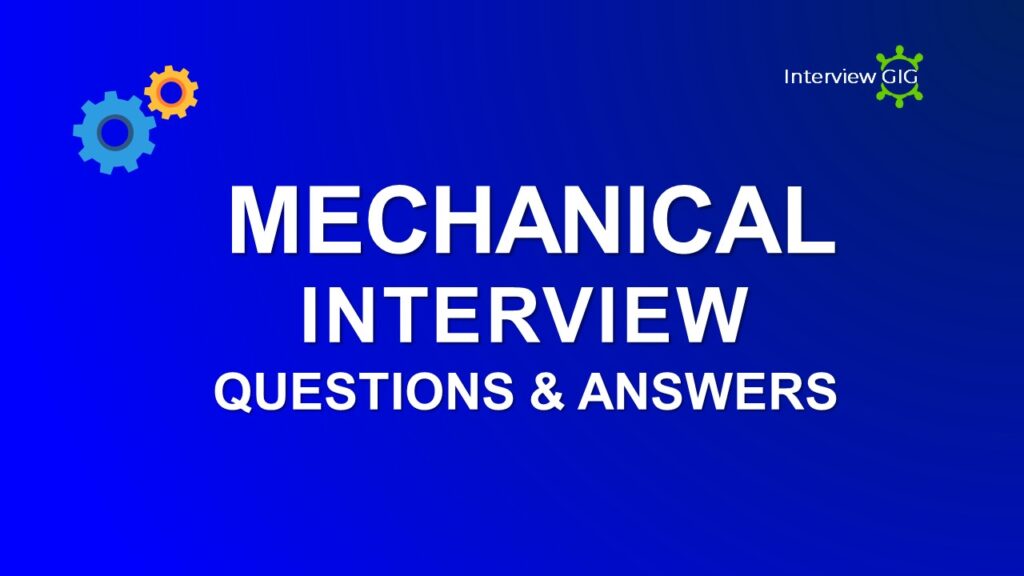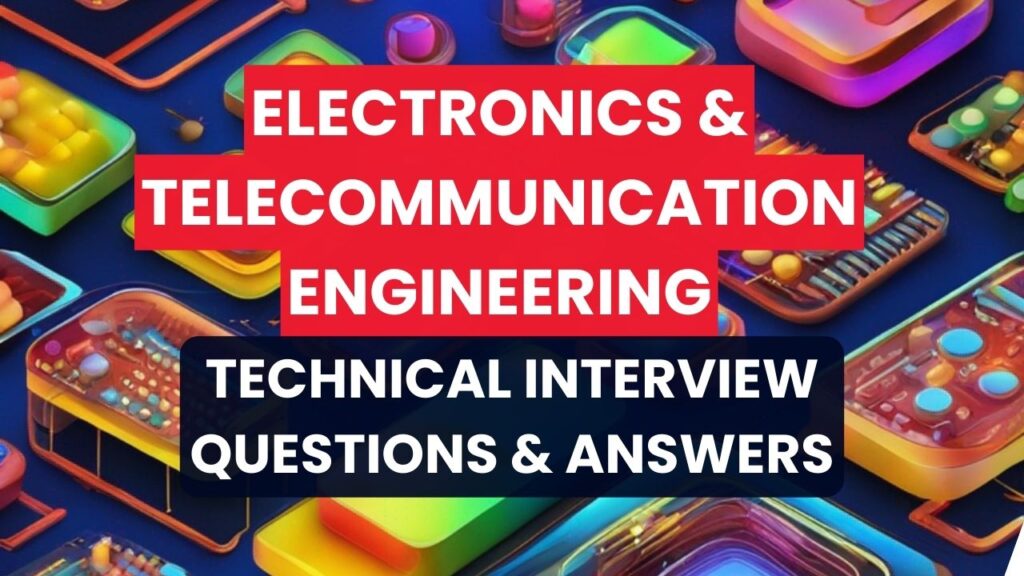Electronics & Telecommunication Engineering integrates electronic principles with telecommunications technology. It encompasses the study of electronic circuits, communication systems, and signal processing. Engineers in this field design, develop, and maintain communication systems, including radio, television, and satellite systems.
They also work on electronic devices, such as smartphones and computers, contributing to advancements in wireless communication, networking, and information technology. This interdisciplinary field plays a pivotal role in shaping our connected world, enabling seamless communication and innovation across various sectors.
Explore E & TC (Electronics & Telecommunication Engineering) interview questions, covering HR, technical, and managerial rounds. Gain insights into general and technical aspects.
E&TC: Common HR Interview Questions witH Sample Answers
Question 1: Can you explain any one thing that is not mentioned in your CV?
Sample Answer: Certainly! While my CV highlights my technical skills and experiences, it may not explicitly mention my passion for designing and building amateur radio equipment. In my free time, I engage in hands-on projects where I experiment with different circuit designs and antenna configurations, allowing me to explore and enhance my practical knowledge in electronics.
Question 2: Why are you not going for higher education?
Sample Answer: Pursuing higher education is a valuable path, but in my case, I have chosen to prioritize gaining real-world experience in the field of Electronics & Telecommunications. I believe that hands-on work and exposure to industry challenges provide a unique and practical learning experience that complements academic knowledge.
Question 3: What did you learn recently?
Sample Answer: Recently, I delved into the implementation of 5G technology and its implications for telecommunications networks. I focused on understanding the intricacies of millimeter-wave communication, beamforming techniques, and the challenges associated with deploying high-frequency bands. This exploration not only broadened my knowledge but also allowed me to appreciate the transformative potential of 5G in shaping the future of telecommunications.
Question 4: Any new invention/technology that you like?
Sample Answer: One technological advancement that I find intriguing is the development of terahertz communication. The potential for terahertz frequencies in wireless communication opens up new possibilities for high-speed, short-range data transfer. Exploring the challenges and breakthroughs in harnessing terahertz waves has captured my interest, and I am eager to witness how this technology evolves in the coming years.
Question 5: Have you done any course (Technical)? (or)
What technical courses have you undertaken to enhance your skills in Electronics & Telecommunications?
Sample Answer: In addition to my academic background, I have actively pursued various technical courses to enhance my expertise in Electronics & Telecommunications. Notably, I completed a specialized course on Advanced Digital Signal Processing, which deepened my understanding of signal processing techniques relevant to telecommunications applications. Additionally, I undertook courses in RF circuit design and wireless communications to strengthen my knowledge in these specific areas.
Question 6: Do you learn any language?
Sample Answer: Yes, I continually learn and understand various languages to better assist and communicate effectively. My language capabilities include programming languages like Python and JavaScript, as well as natural languages like English and others. This versatility allows me to adapt to different tasks and user needs.
Question 7: How are your communication skills?
Sample Answer: My communication skills are a strong suit. As a language model, I’m designed to understand and generate human-like text, facilitating clear and concise communication. I can adapt my communication style based on the context and audience, ensuring effective interaction in various scenarios.
Question 8: How will you manage a job after your marriage?
Sample Answer: Managing a job after marriage involves effective time management, open communication with my spouse, and a commitment to maintaining a work-life balance. I believe in setting priorities, delegating responsibilities when necessary, and fostering a supportive environment at home, which allows for a harmonious integration of personal and professional life.
Question 9: How many close friends do you have?
Sample Answer: While I prioritize quality over quantity in friendships, I have a few close friends with whom I share meaningful connections. These individuals provide support, understanding, and a sense of camaraderie. Cultivating deep connections allows me to maintain a healthy social life while focusing on meaningful relationships.
Question 10: What are your favourite subjects?
Sample Answer: My favourite subjects span a wide range, reflecting my diverse interests. In the technical realm, I thoroughly enjoy delving into topics related to artificial intelligence, data science, and programming. On a personal level, I find psychology and literature fascinating. This eclectic mix of interests keeps me engaged and promotes a holistic approach to learning and personal development.
Question 11: What is the basic difference between microprocessor & microcontroller?
Sample Answer: The fundamental difference lies in their functionality and application. A microprocessor is primarily designed for general-purpose computing tasks, often serving as the CPU in a computer.
On the other hand, a microcontroller is a compact integrated circuit with a processor, memory, and peripherals, tailored for specific control-oriented tasks in embedded systems, such as in robotics, appliances, or automotive applications.
Question 12: What’s the difference between a project leader & manager?
Sample Answer: While both roles involve leadership, a project manager is typically responsible for overseeing the project’s overall planning, execution, and completion.
On the other hand, a project leader often focuses on guiding the team, providing technical direction, and ensuring efficient collaboration among team members. In essence, the manager concentrates on project management aspects, while the leader emphasizes team dynamics and technical aspects.
Question 13: Which area would you prefer, EIS or ITSI?
Sample Answer: Given my background as an Electronics & Telecommunications engineer, I would likely lean towards the EIS (Embedded and Integrated Systems) area. This aligns well with my expertise and interest in embedded systems, control systems, and the integration of hardware and software.
However, I am open to exploring both areas to make an informed decision based on the specific opportunities and challenges each domain offers.
Question 14: Which area are you interested in working on?
Sample Answer: I am particularly interested in working on projects related to wireless communication and networking within the field of Electronics & Telecommunications. My academic background and hands-on experience have equipped me with the skills necessary to contribute to advancements in these areas, and I am enthusiastic about the potential to apply and expand my knowledge in a professional setting.
Question 15: Being an E&TC engineer, how will you manage in IT?
Sample Answer: Transitioning from Electronics & Telecommunications to Information Technology (IT) requires a willingness to adapt and upskill. I believe my strong foundation in core engineering principles, coupled with a proactive approach to learning, positions me well to navigate the IT landscape.
I am committed to staying updated on relevant technologies, engaging in continuous learning, and leveraging my problem-solving skills to excel in an IT environment.
Question 16: What’s the voice range – FM and AM ranges?
Sample Answer: The voice range for FM (Frequency Modulation) typically spans from 88 to 108 MHz, while for AM (Amplitude Modulation), it generally falls between 530 to 1700 kHz. These frequency ranges are allocated for broadcasting audio signals, with FM offering higher quality due to its resistance to noise and interference.
Question 17: How do we decide the dimensions of a laptop screen & TV screen?
Sample Answer: The dimensions of laptop screens and TV screens are determined based on factors such as user preferences, intended use, and technological considerations. For laptops, portability and usability are crucial, so screen size is often balanced with device size.
In contrast, TV screen dimensions are influenced by factors like viewing distance and the desired immersive experience. Market trends, consumer feedback, and technological advancements also play a role in determining screen sizes.
Question 18: What’s the difference between IPv4 and IPv6?
Sample Answer: IPv4 and IPv6 are both protocols for identifying and locating devices on a network, but they differ in their address formats. IPv4 uses a 32-bit address, limiting the number of unique addresses available and leading to address exhaustion.
IPv6, with its 128-bit address format, was introduced to address this limitation, providing an exponentially larger pool of unique addresses. IPv6 also brings improvements in network security, efficiency, and support for emerging technologies.
Question 19: If your boss is arrogant and asks you to work for 10-11 hours daily, how will you react to the situation?
Sample Answer: In such a situation, I would approach it diplomatically by expressing my dedication to the job while also highlighting the importance of maintaining a healthy work-life balance. I might discuss the feasibility of the workload, suggesting alternative solutions such as prioritizing tasks or optimizing workflows.
Open communication about expectations and the impact on well-being is crucial, and I would seek a collaborative resolution that ensures both productivity and employee well-being are considered.
Question 20: If you have written a code and your friend in the team shows the code to the manager, how will you react?
Sample Answer: I would appreciate my friend’s initiative in sharing the code with the manager, as collaboration and transparency are essential in a team. However, I would hope that any concerns or suggestions regarding the code would be communicated directly to me first.
If there are improvements or feedback, I would use it as an opportunity to learn and enhance my coding skills, fostering a constructive environment within the team.
Question 21: If your boss is arrogant, and your team members are also arrogant, how will you handle that situation?
Sample Answer: In a challenging environment with arrogant personalities, I would focus on maintaining a professional and positive attitude. I believe in open communication and would try to understand their perspectives while also asserting my own when necessary.
Establishing clear expectations and boundaries is crucial. I would prioritize teamwork, emphasizing our shared goals, and seek common ground to foster a more collaborative and respectful atmosphere within the team.
Question 22: You have to do a project with 5 people whom you dislike, so how will you manage?
Sample Answer: In a professional setting, personal feelings should not interfere with project success. I would focus on the project’s goals, maintaining a respectful and professional demeanor with all team members. Clear communication, setting expectations, and finding common ground are key strategies.
If conflicts arise, I would address them constructively, possibly involving a mediator if needed, to ensure the project progresses smoothly without personal differences affecting the team’s productivity.
Question 23: How did you deal with a pressure situation?
Sample Answer: When faced with pressure, I rely on effective time management, prioritization, and maintaining a calm mindset. Breaking down complex tasks into smaller, manageable steps helps me stay focused and organized. Additionally, I’m not hesitant to seek support from team members or supervisors if necessary.
By approaching pressure situations systematically and maintaining open communication, I ensure that the quality of work remains high while managing stress effectively.
Question 24: How will you convince a client after refusing the project?
Sample Answer: If circumstances allow reconsideration, I would have an open and honest conversation with the client. I would explain the reasons behind the initial refusal, addressing any concerns or constraints. Additionally, I would highlight potential alternatives, modifications, or compromises that could make the project more feasible.
The key is to communicate transparently, emphasizing my commitment to providing the best possible solution for the client’s needs.
Question 25: How did you manage any pressure situation during academics?
Sample Answer: During academic pressure situations, I adopted a systematic approach. I prioritized tasks based on deadlines, broke down complex topics into manageable sections, and maintained a disciplined study routine. Seeking help from professors or classmates when needed was crucial.
I also incorporated stress-relief activities such as regular breaks, exercise, and adequate sleep. This combination of organization, collaboration, and self-care helped me successfully navigate high-pressure academic scenarios.
Question 26: How many satellites are needed to cover the whole Earth?
Sample Answer: The number of satellites needed to cover the entire Earth depends on the orbit type and coverage requirements. For global coverage, constellations of multiple satellites in Low Earth Orbit (LEO) are commonly used. Systems like SpaceX’s Starlink aim for thousands of satellites to achieve continuous coverage across the globe.
Question 27: Which city is better, either your hometown or Hyderabad/Bengaluru/Chennai/Pune?
Sample Answer: Comparing cities involves subjective factors, such as personal preferences and career opportunities. Each city has its unique charm and advantages. I would consider aspects like job prospects, lifestyle, climate, and cultural preferences to make an informed decision. Ultimately, it depends on individual priorities and goals.
Question 28: Do you have any problem with relocation?
Sample Answer: I am open to relocation and view it as an opportunity for personal and professional growth. I understand that new environments bring new challenges and experiences. Relocation allows me to adapt to diverse work cultures, broaden my perspective, and contribute effectively to the success of the team or project.
I am flexible and ready to embrace the opportunities that come with relocating for the right professional opportunity.
Question 29: Are you okay to work late hours?
Sample Answer: I am open to working late hours when required, especially during critical project phases or deadlines. I believe in ensuring tasks are completed efficiently and meeting project timelines.
Question 30: Are you comfortable to work in ITI services?
Sample Answer: Absolutely, I am comfortable working in ITI services. My skills and experience align well with the demands of the industry, and I am enthusiastic about contributing my expertise to further the goals of the organization.
Question 31: Why should I hire you within the 50 members?
Sample Answer: I bring a unique blend of technical expertise, adaptability, and a collaborative mindset. With a track record of delivering results and the ability to contribute effectively in a team, I can make a significant impact within a smaller team setting.
Question 32: How will you work on a project in one year?
Sample Answer: I would approach the project with a well-defined plan, setting milestones and timelines. Regular assessments and adjustments would ensure progress aligns with objectives. Effective communication within the team, adaptability to challenges, and a focus on continuous improvement would be integral to project success.
Question 33: Would you like to work in business development?
Sample Answer: While my primary expertise lies in technical roles, I am open to exploring opportunities in business development. I believe my strong communication and analytical skills, combined with a strategic mindset, could contribute positively to business growth initiatives.
Question 34: Where do you see yourself in 2 years?
Sample Answer: In two years, I envision advancing my skills and contributing significantly in a more specialized role within the domain. I aim to take on additional responsibilities, possibly in a leadership capacity, and continue making valuable contributions to the success of the team and the organization.
Question 35: Which domain are you interested in and why?
Sample Answer: I am particularly interested in the field of artificial intelligence and machine learning. The endless possibilities for innovation and the potential to solve complex problems in diverse industries captivate me. I see this domain as a frontier where technological advancements can truly make a transformative impact.
Question 36: Tell me about your short-term and long-term goals?
Sample Answer: In the short term, I am focused on deepening my expertise in my current role and taking on challenging projects. Long-term, I aspire to evolve into a leadership position where I can contribute strategically to the organization’s success and mentor others to achieve their professional goals.
Question 37: Any specific goal of life?
Sample Answer: A specific life goal for me is to continually learn and grow, both personally and professionally. I believe in making a positive impact on the lives of others, and I strive to achieve a balance that fosters happiness, meaningful relationships, and continuous self-improvement.
Question 38: If selected or if rejected, what will you do?
Sample Answer: If selected, I would commit wholeheartedly to my new role, contribute effectively to the team, and seize opportunities for professional growth. If rejected, I would use the experience as a learning opportunity, seeking feedback to improve and applying those lessons to future endeavors.
Question 39: What are your salary expectations?
Sample Answer: I appreciate the opportunity to discuss compensation, and I understand that it’s an important aspect of the job. As a recent engineering graduate, my primary focus is on gaining valuable experience and contributing to the success of the team. I am open to a competitive and fair compensation package that reflects the industry standards for this role and considers my skills and qualifications.
I am more interested in the opportunity to learn and grow within the company and contribute my best to the team. I’m confident that we can reach a mutually beneficial arrangement
Question 40: Any questions you want to ask?
Sample Answer: Yes, I would like to know more about the team dynamics and the organization’s approach to professional development. Additionally, understanding the key challenges and priorities currently facing the team would provide valuable insights into the role and its potential impact
Read More:
- Electronics Engineering Interview Questions And Answers
- Technical Interview Questions and Answers-Electronics & Telecommunication 2024
- Common Job Interview Questions And Answers In 2024
- Common Behavioral Interview Questions And Answers
- Leadership Interview Questions And Answers





